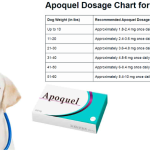Being a pet parent, it is never easy for us to see our furry family members going through the pain of skin allergies and struggling with it. Thanks to the two medicines, Apoquel and Cytopoint, they have emerged as our go-to rescues for handling dog allergies. While both have their working strategies and effectiveness, we will compare these two medicines to determine the best for our dogs according to their needs and seriousness.
Wondering about Apoquel for cats and other pets? Click here to learn more…
Key Points:
- Apoquel and Cytopoint are two medicines popular for handling pet allergies mainly in dogs.
- Both have their working mechanism and workflow, along with some side effects.
- Every pet and their allergies have individual needs, so choosing the medicine according to your vet’s prescription is crucial.
Knowing Apoquel and Cytopoint
Cytopoint and Apoquel are medicines for managing pet allergies trusted by hundreds of pet owners like you and me. However, these medicines have their administration techniques, dosage charts, and possible side effects. These points make the medicines different from one another.
Giving out Cytopoint vs. Apoquel: Apoquel is a miracle in tablets for your dogs. The best way to administer it is by giving it to your pet with their meals. On the other hand, Cytopoint is given to your pets through injection with different dosages altered by your veterinarian, considering your dog’s unique needs. The dose of both medicines mainly depends upon your furry friend’s weight. These medicines are only supposed to be given out under prescription.
Pros of Cytopoint vs. Apoquel: Cytopoint is a syringe-based medicine that directly targets and neutralizes protein-causing pet allergies. This medicine is beneficial in the long term and provides relief for (4-8 weeks). Unlike Cytopoint, Apoquel provides constant relief lasting for 24 hours. It works by distracting the immune response, causing itching. Cytopoint has comparatively fewer side effects than that of Apoquel.
Cons of Cytopoint vs. Apoquel: Like any other medicines, both Apoquel and Cytopoint have some side effects. Your pets will tolerate Cytopoint, but problems may arise during the injection. Apoquel, on the other side, can cause problems like gastrointestinal issues, changed and lazy behavior, chances of infection, and sometimes loss of appetite. Cytopoint requires significantly less maintenance compared to Apoquel.
Critical Differences Between Cytopoint and Apoquel
While Cytopoint and Apoquel are medications used to treat itching and allergy symptoms in pets, they differ in several ways.
| Factor | Cytopoint | Apoquel |
| Mode of Action | Cytopoint works by targeting and neutralizing a specific protein called interleukin-31 (IL-31) that triggers itching and inflammation in dogs | Apoquel works by blocking specific enzymes that play a role in the allergic response, reducing itchiness and inflammation. |
| Administration Method | Cytopoint is given as an injection under the skin, typically every 4-8 weeks. | Apoquel is given in tablet form, generally with meals and two times a day for the first 14 days and then one daily furthermore. |
| Effects Duration | Cytopoint’s relief lasts for 4-8 weeks. | Apoquel gives relief just for 24 hours. |
| Combining with Other Medications | Cytopoint is not quite used in combination with any other medications. | Apoquel interacts with some medications, such as corticosteroids and other antifungal medications. |
Understanding the differences between these two medicines is imperative as they help us pet owners choose the best option for our beloved pets to bring them the relief and an enjoyable life they deserve. Your vet is the main person who chooses the appropriate medicine for your pet, so do not try to select and apply the medication alone.
Productiveness of Cytopoint vs. Apoquel for Allergies
Both of these medicines are equally popular among vets and pet owners, in treating the skin allergies of the pets. But, you might wonder about the effectiveness of these medicines. Let’s dig into this wonder and find out.
Our pets face different problems, such as itching, discomfort, rashes, irritation, and others. Different studies and research have proved that Cytopoint and Apoquel can relieve pets from these problems—Cytopoint functions by eliminating the main protein (IL-31) responsible for generating itches in pets. Apoquel inhibits the cytokines, causing allergic responses.
These medicines are equally effective, and pet owners can use any of them, considering their little friend’s need, situation, and situation. What worked for one, might not work for another for various reasons, as all pets are unique with special needs. Always trust and consult your vet so that they can suggest the best for your pet; they are your pet’s specialist.
The main concern is that the choice of best, either Cytopoint or Apoquel, is decided by looking at the severity of symptoms, the pet’s tolerance, and other unique qualities of your pet friend. You should constantly monitor your pet’s responses to the medicine to find out the productiveness and efficiency of the medication, especially for your dog. You should also look at the benefits and potential risks of the medicines before using them.
Real Case Reviews:
It is prevalent for pets to have skin allergies, and many of us pet parents have gone through this phase once in a lifetime. Some other pet owners like us worldwide have shared their experiences of using Cytopoint and Apoquel. Some of them found Apoquel compelling, while others preferred Cytopoint.
“After our dog showed skin allergy symptoms, we were apprehensive and tried several medications, but nothing seemed to be working. That’s when our vet recommended Cytopoint, and within a few times of getting the dose, the results were visible, and we were amazed to see our dog transforming. Gradually, our dog had overcome all the symptoms and started to live his life to the fullest.”
-User 1
“Our dog was on Apoquel medications for a week, and we could see some relief, but our dog was still dealing with the problem. Then, the vet suggested trying Cytopoint along with Apoquel, which was our best decision. The effectiveness of the medicines was seen, and watching our pet member heal and grow was an emotional memory for us.”
-User 2
After reading these user experiences, we understand that these medications do not follow a one-size-fits-all approach; their doses are tailored individually for every pet. Open communication with the vet and after-dose monitoring is the key to observing the medication’s productivity.
Combining Apoquel and Cytopoint
Sometimes, Apoquel and Cytopoint together can be used as combined medication. Your pet’s well-being is the primary concern, and if these medicines together can do it, then why not? But, it is very important to carefully analyze the side effects and have enough understanding of the potential interactions between medicines.
Cytopoint and Apoquel can be combined to treat seasonal allergies or flea treatments. However, we cannot guarantee the results because this combination has known dangers, and also, some pet owners have had very experiences using these two together.
Cytopoint is a syringe-based medicine that provides relief for 4 to 8 weeks and works by stopping the itch signals. In comparison, Apoquel is an oral medicine that blocks some itch-generating elements and provides relief for about a day. Using them together might work in some cases, but there are better ideas than this because it risks conflicting effects or unnecessary treatment.
Hence, it is always better to consult your vet and ask for advice before combining Apoquel and Cytopoint. Your vet knows your pet from the inside out, and they will suggest the best after examining your fur buddy’s specific conditions. Trust your vet completely and follow their guidelines to achieve the best results.
Finally, maintaining your dog’s health is the top priority, and Cytopoint and Apoquel could help you. Always seek advice from your veterinarian because you would not want to ruin your pet’s life due to that one decision. You need to identify the causes of your pet’s allergies and consider their individual needs and situation before trying out any medications.
Cost Comparison of Apoquel and Cytopoint
Being a pet owner myself, maintaining your pet’s health might sometimes cost you a little out of your budget. In the case of Cytopoint and Apoquel, we will analyze their costs and prices in the long term for both of the medicines.
| Medicine | Cost | How often? |
| Apoquel | $30-50 for a 16mg tablet two | o times a day |
| Cytopoint | $50-150 for an injection | n injection in every 4-8 weeks |
From the table above, we can see that the cost of Cytopoint is higher than that of Apoquel. But we should remember that Cytopoint injection is given only once in 4-8 weeks, whereas Apoquel tablets are given twice a day. So, the overall cost depends on how long our pet needs medication.
In the long term, the cost might be different for different pets. Your pet may require more frequent doses of Cytopoint or Apoquel, and others might not need the same. Hence, the cost varies in the long term, and you should pre-analyze the cost to ensure that you are financially stable when choosing the best medication.
The exact cost comparison of Cytopoint and Apoquel is not reasonably possible because it is based on each pet’s different situations and the owner’s financial condition. So, the main focus is to carefully watch out for your pet’s situation and pre-discuss the cost of the whole medication process with the vet to avoid future problems and ensure your pet’s health with the best choice.
Possible Side Effects and Reaction of Apoquel and Cytopoint
Our pet can tolerate Apoquel and Cytopoint quite well, but as we know, all the medicines have some side effects that apply to both. While both of them have some common possible risks, some risks and side effects of these medicines may vary with each other. Generally, the side effects are mild in most cases, but you should be watchful because the risk can be severe and breathtaking in rare cases.
Common side effects include:
- Vomiting and diarrhea due to upset stomach
- Loss of appetite
- Low energy and laziness
- Infections in the ear and urinary tract
Serious side effects requiring immediate veterinary help include:
- Adverse allergic reactions, including swellings and heavy breathing
- Seizures
- Higher risk for infections
- Problems in the immune system for long-term
We must understand that not every pet has to experience the side effects, and the risks depend on the severity of the pet’s health history. Watching out for every detail of your furry companions’ symptoms and changes, along with seeking the vet’s advice, is the first and foremost step in starting any medication.
Overcoming Risk of Side Effects
The best way to ensure your pet does not face any side effects from Apoquel or Cytopoint is to listen to your vet and seek their guidance throughout the journey. They will perform routine checkups to monitor for changes in the pet’s behavior or health condition. Talking to your vet at the right time will save you and your pet from the potential side effects of the treatments.
As a pet owner, you can also contribute to making your pet’s life healthier and more accessible by providing them with a proper routine diet, and some daily exercises and keeping them away from potential allergy-causing factors and causes.
In general, Apoquel and Cytopoint are both effective treatments for pet allergies. However, both these medicines come with potential side effects, and with proper communication with your vet, you can overcome those risky side effects. You and your vet help provide your pet with the healthy and happy life they deserve.
Better Choice Between Apoquel and Cytopoint
We have already discussed the benefits, productivity, side effects, and cost analysis of Apoquel and Cytopoint. After going through all these topics, what do you think is best, Apoquel or Cytopoint?
These medicines have their benefits and have healed many pets suffering from allergies. Some key points and factors make them different from one another and one more suitable than the other, depending upon your pet’s individual needs.
Apoquel: It is a tablet-based medicine given orally to your pet with their meal, once or twice a day, with appropriate dosages. It blocks the enzymes causing itching and allergies in pets, giving them instant relief lasting for 24 hours. The relief can be seen within 4 hours but can also cause some gastritis and appetite problems in pets.
Cytopoint: It is an injectable liquid-based medicine with more extended relief, lasting 4-8 weeks. It mainly targets and destroys the main protein causing allergies in pets. It has comparatively lower risks and side effects than Apoquel, but the medicine needs some time to work.
Both of the medicines are equal in the context of their productivity. They both productively work to eliminate pet allergies. Research has shown that Apoquel is effective in providing instant relief, while Cytopoint is suitable for long-term allergy management, providing relief for a more extended period.
Talking about the side effects of these medicines, both have potential adverse effects that should be well-known by the pet owners before using them. Cytopoint is known for having fewer side effects than Apoquel, which is why some users find it the best option.
Getting into the budget matter, these medicines have different costs, but the actual treatment cost is based on the period that your pet has to go through and different dosages altered according to the needs of your pet.
Wrapping this up, there is no exact answer for determining which is better among these medicines: Apoquel and Cytopoint. It is about your pet’s unique needs and preferences for choosing the best option for you and your pet friend.
Testimonials and User Experiences
Choosing between Apoquel and Cytopoint can be confusing for you, and you should go through user reviews and stories to find the matching situation with one of the user stories and then choose accordingly. So, here are some user stories sharing experiences for you:
“After going through those never-ending starches for days and nights where nothing worked as a treatment, we tried Cytopoint for our pet. The itching and inflammation stopped within a day of using it, and we were so happy and lucky not to have any side effects after using.” -Jared P.
“Apoquel has been a miracle for my pet. She suffered a lot from skin allergies, and we were equally disturbed. It has already been a month for my dog on Apoquel, and she is doing great. She got instant relief within hours. I just love Apoquel.” –Shelly T.
“My two dogs have been taking Apoquel for a year now, and it is just fantastic. They both started having allergies at the same time, and it was so hard for me to handle both of them. My vet then prescribed Apoquel for my dogs, and since then, my dogs and I are living the best life, Thanks to Apoquel!” –Bob L.
Overall, Apoquel and Cytopoint have both received positive reviews from users worldwide, and they have suggested both according to their stories. Every pet has a different need, and you should try and choose what works best for them. Your pet’s vet is the main hero here, so please consult with them first and then decide.
Future Possibilities of Alternatives
- Explore Beyond Apoquel and Cytopoint: While Apoquel and Cytopoint lead the way in allergy and itch management for pets, the veterinary field is continuously evolving with potential alternatives.
- Understand Different Mechanisms: The key to choosing the right treatment lies in understanding the distinct modes of action of Apoquel and Cytopoint, alongside other available options tailored to specific allergy types and symptoms in dogs.
- Tailored Treatment Options: Depending on the root cause of your pet’s allergies, such as immune system issues, veterinarians may recommend targeted treatments like immunotherapy or specific dietary adjustments.
- Stay Informed on Innovations: The future holds promising alternative treatments with unique benefits and mechanisms compared to current options, enhancing allergy management for pets.
- Consult with Your Vet: Always seek professional advice to navigate the expanding landscape of allergy treatments, ensuring your pet receives the most appropriate and effective care.
- Personalized Care is Key: Recognize that each pet’s allergy situation is unique; what works for one may not work for another, emphasizing the importance of a customized approach to treatment.
- Keep Updated on Veterinary Advances: Regularly engaging with your vet and staying informed about new developments can lead to discovering novel, potentially more suitable allergy management strategies for your furry friend.
Conclusion
- Consider Key Factors: When choosing between Apoquel and Cytopoint, evaluate their efficiency, onset of action, duration of effect, side effects, cost, and suitability for your pet.
- Seek Veterinary Advice: Consulting with a vet is crucial. They provide personalized advice based on your pet’s health, medical history, and specific needs.
- Discuss Your Pet’s History: Always share your pet’s medical background and any existing conditions with the vet to tailor the best treatment plan.
- Weigh Benefits Against Risks: Analyze the advantages and potential risks associated with both Apoquel and Cytopoint to make an informed decision.
- Cost Considerations: Consider the financial aspect of treatment, as the costs of Apoquel and Cytopoint may vary depending on your pet’s needs.
- Explore All Options: Stay informed about the latest advancements in allergy management for pets beyond Apoquel and Cytopoint.
- Maintain Open Communication with Your Vet: Regularly update your veterinarian on your pet’s condition to adjust the treatment plan as necessary for optimal health.
- Personalized Approach to Pet Care: Understand that what works for one pet may not work for another; personalized veterinary guidance is key to finding the best solution.










